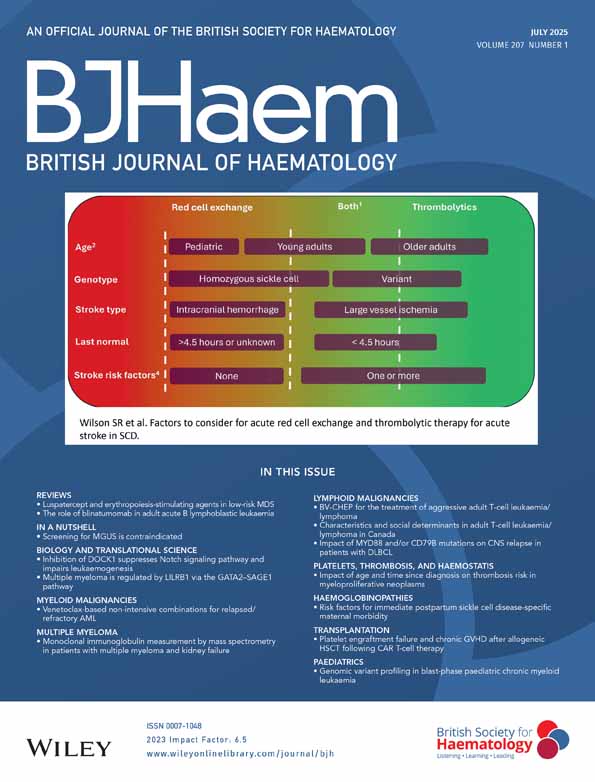Effect of the protein tyrosine kinase inhibitor genistein on normal and leukaemic haemopoietic progenitor cells
Abstract
Receptor and nonreceptor protein tyrosine kinases (PTKs) play a key role in the control of normal and neoplastic cell growth. The availability of PTK inhibitors prompted us to evaluate the effects of genistein, a natural inhibitor of PTKs, on in vitro colony formation by normal multilineage colony-forming units (CFU-Mix), erythroid bursts (BFU-E), granulocyte-macrophage colony-forming units (CFU-GM), long-term culture-initiating cells (LTC-IC) and acute myelogenous leukaemia colony-forming units (CFU-AML). Continuous exposure of normal marrow and blood mononuclear non-adherent cells, blood CD34+CD45RA− cells, and leukaemic blasts to increasing doses of genistein (1–100 μM) resulted in a statistically significant (P ≤ 0.05) dose-dependent suppression of CFU-Mix, BFU-E, CFU-GM and CFU-AML growth. Regression analysis showed that growth inhibition was linearly related to genistein concentration. Genistein dose causing 50% inhibition (ID50) of CFU-AML was significantly lower compared to CFU-GM ID50 for marrow (19 v 32 μMP ≤0.017), unseparated blood (19 v 44 μMP ≤ 0.028) or CD34+CD45RA− blood (19 v 36, P ≤ 0.04). Preincubation of leukaemic blasts with genistein (200 μM) for 1–2 h confirmed that CFU-AML were significantly more sensitive than normal marrow and blood CFU-GM to genistein. Preincubation conditions which maximally suppressed leukaemic and normal colony growth spared a substantial percentage of marrow (29 ± 4%) and blood (40 ± 3%) LTC-IC. In conclusion, our data demonstrate that: (a) genistein strongly inhibits the growth of normal and leukaemic haemopoietic progenitors; (b) growth inhibition is dose- and time-dependent; (c) leukaemic progenitors are more sensitive than normal progenitors to genistein-induced growth inhibition; (d) genistein exerts a direct toxic effect on haemopoietic cells while sparing a substantial proportion of LTC-IC. The potent CFU-AML growth inhibition associated with the relative resistance of normal LTC-IC strongly supports the use of genistein for marrow purging.




